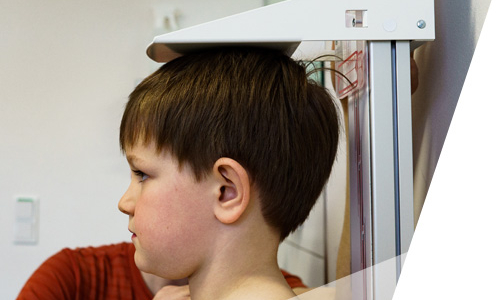
RESEARCH PROFILE
The LIFE Child-study is a large population-based longitudinal cohort study conducted in the city of Leipzig, Germany. As a part of the Leipzig Research Center for Civilization Diseases, it aims to monitor child development from birth to adulthood and to understand the etiology of lifestyle diseases such as obesity.

The LIFE Child study
The LIFE Child study is a longitudinal cohort study conducted at the Research Center for Civilization Diseases in Leipzig, Germany. Its purpose is to monitor child development and investigate factors associated with health and disease, with a particular focus on lifestyle diseases such as overweight and allergies.
The LIFE Child study started in 2011 and is ongoing. Participants are recruited between the 24th week of gestation and 16 years of child age using advertisements at clinics, schools, and health institutions. Follow-up visits take place annually, up to and including a final possible visit when the participant is 20 years of age. To date (November 2019), more than 4500 children and 1000 pregnant women have taken part, with the majority going on to attend the follow-up visits. The invitation to participate is extended to all children, parents and pregnant women who are interested in the study and are not suffering from any chronic, chromosomal or syndromic disease. The great majority of recruited participants (99%) are drawn from the city of Leipzig and the surrounding area.
The cohorts
The LIFE Child project is based on three, partially overlapping cohorts; the Birth Cohort, the Health Cohort, and the Obesity Cohort. The Birth Cohort aims to detect behavioral, biological and environmental factors during pregnancy, birth or in the early postnatal period that might influence future health and the development of diseases. Examinations are undertaken during pregnancy (24th and 36th week of gestation), and at 3 months and 6 months of child age. Additionally, for children born at the Leipzig University Hospital, samples of cord blood and placental tissue are collected directly after birth. Children in the Birth Cohort are integrated into the Health Cohort when they reach one year of age.

The principal aim of the Health Cohort is to investigate healthy child development. Participants may be added to the cohort between 1 and 16 years of age, and follow-up visits are planned once a year. The Obesity Cohort is composed of obese children (body mass index > 97th percentile of the German age- and gender-specific norms) between the ages of 6 and 20 years. A control group of normal weight children is used for comparison. In addition to the assessments performed in the Health Cohort, participants of the Obesity Cohort and the control group undergo a series of specific examinations that serve to identify facets of the children’s behavior, environment and biological predispositions that may be associated with obesity or normal weight, and to study the development of diseases related to obesity (e.g., metabolic disorders).
Study programm
Depending on cohort and child age, participants in the LIFE Child study follow slightly different study programs. The programs are very detailed and consist of interviews (e.g., anamnesis), medical examinations (e.g., anthropometry, blood pressure measurement, spirometry), standardized tests (e.g., development test, motoric test), questionnaires (e.g., on lifestyle, social position, mental health), and the collection of biological samples (e.g., blood, urine, stool). The use of highly detailed study programs provides a deep level of phenotyping of cohorts of children who are growing up in the twenty-first century.

The LIFE child team works with a number of internal and external partner institutions and is interested in establishing links with new research partners. If you are interested in collaborating with the LIFE Child study team, please complete the form project request.
Please use this link to see our study protocol (German).
Study protocol
The LIFE Child study is based on a comprehensive study protocol approved by the Ethics Committee of the Medical Faculty of the University of Leipzig. The LIFE Child handbook provides a detailed overview of our research objectives on the topic of children’s health as well as the study design, research methods and evaluation.
Please use this link to see our study protocol (German language).